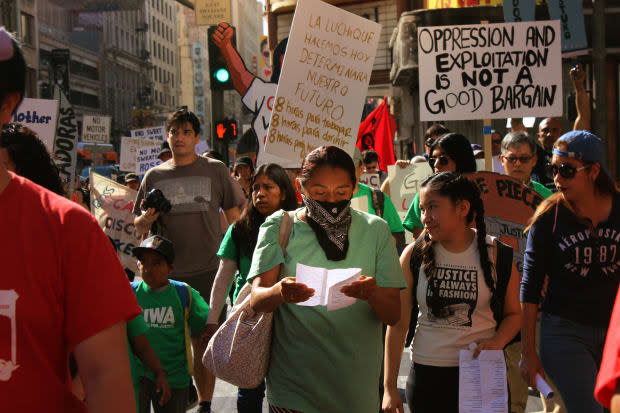Protection for Long-Exploited California Garment Workers Is Finally Signed Into Law
The Garment Worker Protection Act enforces fair compensation and holds fashion brands accountable for unpaid wages.

Photo: Aditi Mayer
Monday evening marked a historic, potentially life-changing victory for more than 45,000 garment workers in California and a win for advocates of a more ethical fashion industry: Governor Gavin Newsom signed the Garment Worker Protection Act, also known as Senate Bill 62 (or SB62), into law.
The Garment Worker Protection Act, which was introduced by Senator María Elena Durazo (D-Los Angeles) in December 2020, requires that workers receive hourly pay in lieu of being paid by the piece, a practice that employers routinely exploited to pay below minimum wage and increase their own profits. It also holds fashion companies accountable for labor violations by contractors; in the past, brands have used layers of subcontractors to distance themselves from — and avoid liability for — unethical working conditions.
"California is holding corporations accountable and recognizing the dignity and humanity of our workers, who have helped build the fifth-largest economy in the world," said Governor Newsom, in a statement. "These measures protect marginalized low-wage workers, many of whom are women of color and immigrants, ensuring they are paid what they are due and improving workplace conditions. We are committed to having their backs as we work to build a stronger, more inclusive economy."
"Today we won justice for garment workers," said Senator Durazo, in a statement. "For too long, bad-actor manufacturers have exploited garment workers toiling in unsanitary conditions for as little as $5 an hour. I applaud Governor Newsom for signing this important legislation to safeguard legal wages and dignified working conditions for this highly-skilled workforce and level the playing field for ethical manufacturers that are doing the right thing."
The signage follows efforts by garment workers and their allies to expose the rampant exploitation of the people employed by apparel factories in L.A., which has the highest concentration of garment workers in the country. These workers have had to endure decades of injustices, including wage theft, intimidation and poor health and safety conditions — which the Covid-19 pandemic didn't help. Plus, in an increasingly expensive city like L.A., even those making the $14 minimum wage (for employers with 26+ employees) struggle to afford the basic costs of living; the average hourly rate of a Los Angeles garment worker is $6.
"While the left was advocating for an increase in the minimum wage, there was an entire group of workers left out of legal classification which would grant them even the existing wage protections," explains Kathryn Rubio, senior editor at Above the Law (Fashionista's sister site). "SB 62 ends — in California — piece rate compensation, and can provide a model for other jurisdictions looking to protect garment workers."
Among the bill's supporters were over 160 fashion brands and organizations like the Garment Worker Center, a Los Angeles-based workers' rights group and one of the bill's sponsors.
"Garment workers have been exploited and failed by the system for far too long, and because of the tireless organizing efforts of those workers and the bold action that Governor Newsom took today, the industry will become something California can be proud of," Marissa Nuncio, the group's director, said, in a statement.
Elizabeth Cline, Remake's director of policy and advocacy, participated in the campaign to pass the bill. In response to the news this week, she said: "With one law, we dispelled the biggest lie in fashion, which is that brands aren't responsible to garment makers. SB62 is a shift in thinking and a shift in power as much as it is a change in law."
"With real brand accountability under our belt in the world's fifth largest economy, we can start to move towards policies globally that establish true partnerships between suppliers, brands and garment workers as there's shared risk and shared rewards," she continued. "It's a game-changing moment. It gives us a realistic glimpse into a future where ethical clothing is the norm, not a niche."
Never miss the latest fashion industry news. Sign up for the Fashionista daily newsletter.

 Yahoo Finance
Yahoo Finance 